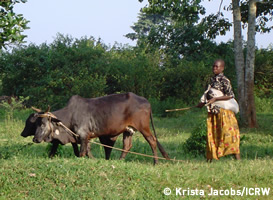
The right to land
Media Contact
Last week in Rome, a group of delegates brought together by the United Nations Food and Agriculture Organization agreed to a set of global guidelines on responsible access to and ownership of land. One of the important issues covered in the guidelines is promoting women’s equal right to access and own land. This was welcome news to me, especially after spending the past two weeks in Uganda looking into the challenges to land rights that rural women farmers face there.
In the grand scheme of things, a set of U.N.-brokered, voluntary guidelines on a seemingly niche issue might seem insignificant in a world rife with problems. They are not. The guidelines could build momentum for governments to revamp policies, making it easier for women like those I’ve met in Uganda to own and access land – instead of being dependent on husbands, fathers and brothers. The guidelines also could prevent others from grabbing land and property from widows, an all too common phenomenon in developing countries.
Such changes won’t only help women – they also hold the potential to make a much broader impact on communities and countries.

Still, women in low-income societies are five times less likely than men to own land, and when they do, their farms are usually smaller and less fertile. Putting the new guidelines into practice will take a lot of effort, even for countries that have been working on land reform for a long time.
Uganda – like many countries in sub-Saharan Africa – has grappled with the thorny issue of land rights for years. The most recent wave of reform began in the 1990s, and there is still a lot of work to be done to make the changes on paper a reality for the women who till the soil of Uganda’s rolling countryside, rich in crops like coffee, bananas and corn.

Despite the challenging reality, progress is being made. For instance, organizations such as ICRW’s partner Uganda Land Alliance educate thousands of women, men and leaders about national land laws through village meetings, radio programs and volunteers. Then there are groups such as the Land and Equity Movement, which helps cultural leaders and institutions resolve land disputes. They have guided different clans towards a consensus that blends law and age-old customs, encouraging leaders to write down rules and articulate how they will protect women from land grabs and respect their property rights. Hundreds of copies have been distributed to clan leaders, women and men, police officers and development organizations.
As these village-level efforts take place, governments are starting to align their policies and practices with the guidelines that were agreed to in Rome. As additional governments do so, it will help put more women’s names on deeds, allowing them to become economically secure and pursue new income-generating opportunities.
And in the end, as the evidence shows, entire societies will reap the benefits.
